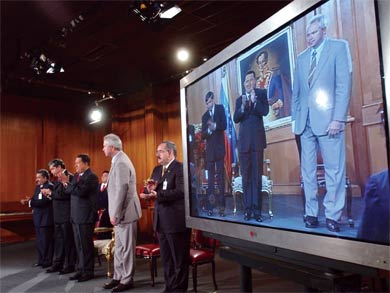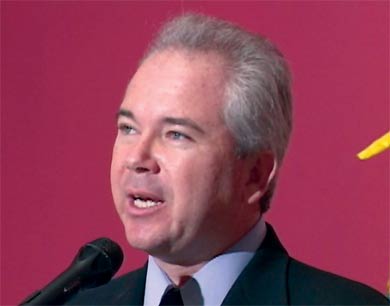
The Minister of Energy and Mining, Rafael Ramírez, affirms that the regional energy agreements will be subscribed thanks to the political agreements, like the ones established with Buenos Aires and Brasilia. He asserts that Venezuela, like the rest of the oil producing countries, is interested in the Chinese market, and does not discard the possibility of a business triangle with Russia as the third vertex. In his defense of the social funds created and financed by Petróleos de Venezuela, he points out that these measures are the response to a moral commitment of the corporation.
“After the oil sabotage, which by the way started all this 40 $- per- barrel story, we began to define the new face of the state oil company (Pdvsa), its new structure, its new values, and the way to adapt them to the new Law of Hydrocarbons. Because it clearly stipulates in its fifth article, that the resources from the oil activity shall address the people’s health and education, and the development of infrastructure, that is, everything that brings about social well being.”, explains the Minister of Energy and Finance, Rafael Ramírez, when asked about the origin of the social funds created by the state corporation.
Our industry- he adds -can not continue to be a corporation that only makes contributions to the national treasury, which is very important, but this model maintains an economy that is reliant almost entirely on oil. For us, Pdvsa should also be- in the framework of the new Law of Hydrocarbons and within the spirit of our Constitution- an effective instrument to promote national development, in order to overcome all of our structural problems.
“We made our budget for 2004 based on the 2003 savings, over 2 billion $. But we also destined 5 billion $ for the Pdvsa investment budget, that is, we almost doubled the last budget of 3 billion $. And we allocated 70% of those 5 billion $ to extraction and production. Furthermore, we decided to invest a percentage of this budget to lever up two fundamental sectors of our economy: infrastructure development and agriculture.”
- Spokesmen for the opposition have stated that these funds are only temporary, since they are simply part of the referendum campaign.
- The funds are a responsibility of the Venezuelan Oil Corporation (CVP). This is emblematic because this subsidiary of Pdvsa, had been converted into an instrument for the privatization of the industry. We have extended its functions and adjusted them to the new law. CVP has been allotted two trusteeships: one of 500 million $ for infrastructure, and another one of 600 million for agriculture. They are both conceived as investments. In other words, we have created a trusteeship administered by the National Bank for Social Development (Bandes), a fundamental part in this new policy of levering up the financing of productive sectors. This institution fulfills all of our national banking system’s requirements in order to guarantee investment returns. Because we are going to establish a fund that will not depend on the circumstances in the oil market; we are going to be free from those cycles of rise and fall of the oil prices. Pdvsa is faced with an ethical and moral decision. We must invest on the social sectors, to go along with what our Constitution establishes.
Moreover, we are going through social hardships, and Pdvsa must be a fundamental factor in helping to reverse this situation. That explains why these 600 million dollar funds are destined basically to support the educational missions, and mainly Mission Ribas, because it has been assigned to our Ministry as one of its main tasks, and we are carrying it out very well. These resources are meant to support the Ribas high school educational mission, the scholarship holders of the Sucre university educational mission, the “Barrio Adentro” health Mission, the “Identidad” citizen registration mission, and the “Vuelvan Caras” mission for the training of future employees and later insertion in productive activities. All these activities that we have been carrying out can be perfectly audited.
- Some people wonder if that should be the role of Pdvsa. They claim that the company’s involvement in other affairs that are not related with the oil business has weakened the company.
- Well, that’s their position. There has been a sustained campaign against Pdvsa, our oil industry. It seems to me that this criticism goes beyond our internal political disputes. For the first time, there has been an orchestrated campaign against our main national industry. This is something we will have to evaluate in the course of time. As for our returns, they have been exceptional. We have had extraordinary savings. And those who claim that our industry has been diminished with the dismissal of the participants in the oil sabotage to the industry still underestimate us. I have always said that in this type of debate, one must analyze the returns, the results, the profits, the savings, the sales, our positioning in the market, our expansion. And with respect to the debate over what should be done with an oil company, it is a great dilemma, just what led the ex - Pdvsa employee ONG “Gente de Petróleo”(Petroleum People) to sabotage the industry. Pdvsa is a public corporation with a social responsibility.
The fact that oil prices were much higher than what had been foreseen, made it possible to break the vicious cycle of disinvestment that has been present in our economy, says Ramírez.
We -he asserts- are still selling our currencies to the Central Bank. But we decided to set apart, as an activity of Pdvsa, a fund in dollars in order carry out infrastructure projects that had been held back for over twenty years. This means that we are not going to allow squandering of the surplus again.
We want to invest them on infrastructure projects that can lever up our national development. ¿What projects are there?. La Vueltosa, for instance, with 35 million $ for public works, and that has been paralyzed for 25 years. The Pedro Camejo plant, with 100 million $ in Carabobo state. The Ezquiel Zamora sugar factory. The Conviasa airline, with 16 million $, to help reverse the effects of the privatization of Viasa, our national airline.

- But ¿how is all this financing administered?
- Through a Bandes trusteeship in dollars abroad. With this trusteeship, the institution carrying out the project is granted a loan. CVP does not execute the project. It is carried out by the institution that receives the loan. And it is this institution which compromises with Bandes on the terms and conditions of the loan payments. This means that the money returns to the country.
There is a similar policy in Brazil, where 50 billion dollars are destined for this type of fundamental projects for national development. But we were also inspired by the model applied in Norway, where the state makes recoverable investments of its resources to promote infrastructure projects that make it possible to have tangible works even in a scenario of low oil prices.
- What’s the amount of this fund already?
- At this moment, 1.2 billion $
- What caused the confrontation between you and deputy Róger Rondón?
- I have been trying to find a politically sustainable explanation. That would be satisfactory, because people can simply distance themselves from the government and join the opposition; that’s part of the dynamics in a democracy. There are people who do it and others who don’t...
- Is that explanation valid for this case?
- It is unfortunate that personal matters interfere in these issues. Deputy Rondón has launched several groundless personal attacks. I would really like us all to be more responsible, and to raise the level of discussion on such fundamental issues for our country. We can’t just limit debates to one or two deputies ranting on before an assembly, with all impunity rather than immunity.
Oriental and Southern Plans
Currently, there is an agreement between Pdvsa and Petrobras. But now we are going to subscribe one between the Ministries of Energy of both countries(Venezuela and Brazil), through which we seek to strengthen the idea of Petroamérica. Because we intend to start a strong alliance with Argentina, Bolivia, and Brazil, says the Minister of Energy and Mining.
“Thanks to Petrobras we will attain very important synergy. Every time we take fuel to Argentina, we will be able to come back up with products from Petrobras. There are plans to make several investments in the Pernambuco refinery, in another one in Uruguay, and in a fuel supply network in Argentina. We want to know if we can carry out joint petrochemical, gas, and exploration projects. That’s our agenda".
- Some months ago, there were rumors that Pdvsa was going to try to leave the U.S. markets in order to enter the Chinese market more strongly...
- Well, not trying to sell to China, is being outside the realities of the market. China is a giant with an enormous economic growth. If all Arabic countries sell to China, I don’t see why we can’t do it .
- But they are closer.
- Yes. They are closer, but we know what we are doing. We have some ideas to sell to China, alliances with the Russians , for instance. We could make a triangulation, or triple alliance. We have to open up our minds.
- What do you want to do in Argentina and Uruguay? There had been a bidding process for La Teja some years ago. Is Pdvsa still interested in it?
- In the past, Pdvsa had the characteristic vision of any transnational corporation. We are not aiming to be a country that buys bankrupt companies at a cheap bargain price. That is not our vision. Our vision is integration. That’s why we have said, that the political agreements come first, the agreements like the ones subscribed with Argentina and Bolivia, and the one we are going to subscribe with Brazil or with the Caribbean countries come first.
Once we have reached a political agreement on what we want to do, the commercial companies will come, working under the protection and terms of those agreements. In the case of Uruguay, we said that we would not participate in the privatization of the refinery, as was initially proposed. Let’s wait until they decide exactly what they want to do, and then we will be glad to join them with our perspective on Petrosur, which we are working out with Argentina, Paraguay, and Brazil.
 Articles by this author
Articles by this author











Stay In Touch
Follow us on social networks
Subscribe to weekly newsletter